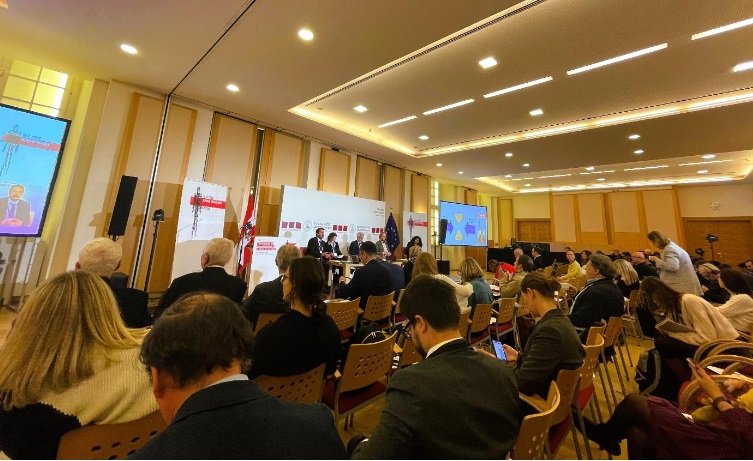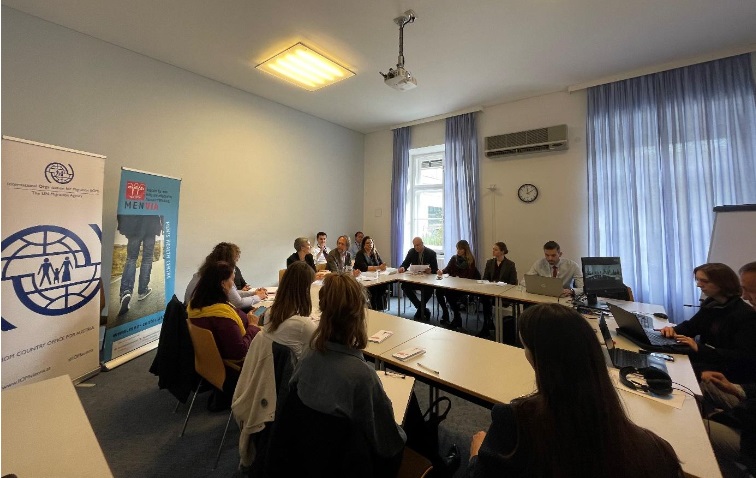Concrete and overarching collaboration is required
The struggle against human trafficking requires close collaboration between state and non-state actors at national, regional and international levels. This year’s Conference, themed “Human trafficking – a private matter?”, investigated the connections between protagonists and victims. Very often, relationships of trust are exploited during human trafficking, with new technologies also playing a fundamental role. New methods and tools used for human trafficking need to be recognised and named if qualified prevention strategies are to be worked out subsequently. The Conference creates a space for risks and opportunities to be discussed in fields such as victim protection, child trafficking and the role of civil society in workshops and podium discussions between experts and NGOs. The Austrian Foreign Ministry, together with others, has been campaigning against human trafficking since 2004 by means of its Task Force; the annual Conference of this Task Force, in collaboration with the IOM and the OSCE, is a concrete countermeasure to the trend.

Human trafficking – a private matter?
Organised by Task Force Human Trafficking Austria on 17 October 2024, a range of workshops, talks and interactions discussed the conditions created by our society that make it possible for human trafficking to remain in the shadows of public society. How can it be that society often does not acknowledge the problem as such? Instead, issues and problems such as these are often shifted onto individuals. But who would actively decide to be part of human trafficking? And if they do so, there are also structural conditions underlying this that must be precisely acknowledged and named.
As mentioned above, participants had the opportunity to take part in numerous workshops covering a wide variety of different issues, stimulating thinking on the subjects and opening up new perspectives. One outstanding example of this was Workshop No. 3, entitled “Male vulnerability and exploitation: ‘private failure’ or social responsibility?”, which focussed on the often overlooked and underestimated vulnerability of men. The discussion highlighted how closely male vulnerability is interwoven with societal structures and expectations, and questioned whether these should be considered individual failure or collective social responsibility. Expert insights and valuable experience were shared by Mariella Jordanova-Hudetz from AmberMed and Manfred Buchner from MEN VIA, who, thanks to their differing backgrounds and areas of expertise, considered the issue from different viewpoints and were immediately able to report directly from practice. The workshop began with profound insights highlighting how complex the entanglements of male vulnerabilities often are, and how these affect not just individual life reality, but also social norms and imagined roles.
Workshop No. 3: looking beyond the facade of male role models

Stereotypical images of masculinity are not just deeply-anchored within society, but also fixed in the individual self-images of many men. These entrenched patterns of behaviour often lead to needs and vulnerabilities being ignored or suppressed, making men particularly susceptible to exploitation. This exploitation can take many forms, including the rejection of personal weaknesses on the one hand, and denial of access to the job market on the other; this is particularly true when personal documents are missing or false. Men often fear losing their male status, and feel obligated to take on the role of family provider, as a result of which they frequently accept a great deal in order not to lose their job.
This often leads to a spiral of dependency which is difficult to break. Particularly traumatised men are confronted with major challenges: their experiences are rarely thematicised, and the stigmatisation often prevents them from returning to their usual home environment. Exploitation of men is often the result of multi-layered suppression and structural disadvantage, which is insufficiently addressed.
Conclusion of the workshops
After the individual workshops, all the participants came together again in the main hall to hear the results and discuss the content of the respective groups. The aim was to provide an overview of the issues discussed in the workshops, and by doing so, also to highlight individual cases.
At Workshop 1, there was intense discussion of the role of civil society, and particularly the issue of when and in which cases the police should be called in. By examining individual fates, Workshop 2 highlighted how difficult it is to get relevant information to enable people to deal with their concrete problems. Once again, moreover, it highlighted the fact that protection for those impacted often ends when they reach the age of 18, so creating another area of conflict. Workshop 3, as described above, was dedicated to male vulnerability and the question of whether this should be understood as a private failure or the responsibility of society as a whole. Finally, Workshop 4 dealt with the various forms of multiple exploitation in private households, and examined the complexity and frequency of this problem.
The one-day event offered a wide range of valuable impulses and discussions, held in both German and English. The issues discussed covered a broad spectrum, ranging from civil society and police intervention to individual defencelessness and multiple exploitation.
The diversity of the invited experts, who came from practice, administration and state authorities, and contributed well-founded and practical perspectives as a result, was particularly helpful. Conferences of this nature are of real significance, since they not only raise awareness of important issues and highlight their topicality, but also draw public attention to existing abuses and support possible solutions.
Translated by Tim Lywood
#Menschenhandel #StrukturelleHürden #Arbeitsmarktzugang #Ausbeutung #AgainstHumanTrafficking #GegenMenschenhandel #EndExploitation #EndTrafficking #HopeForTheFuture #Österreich
